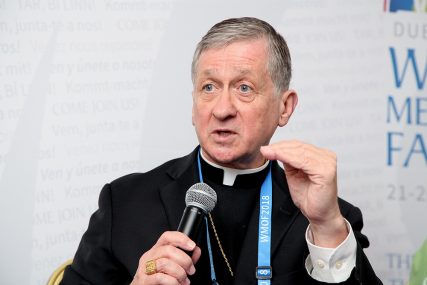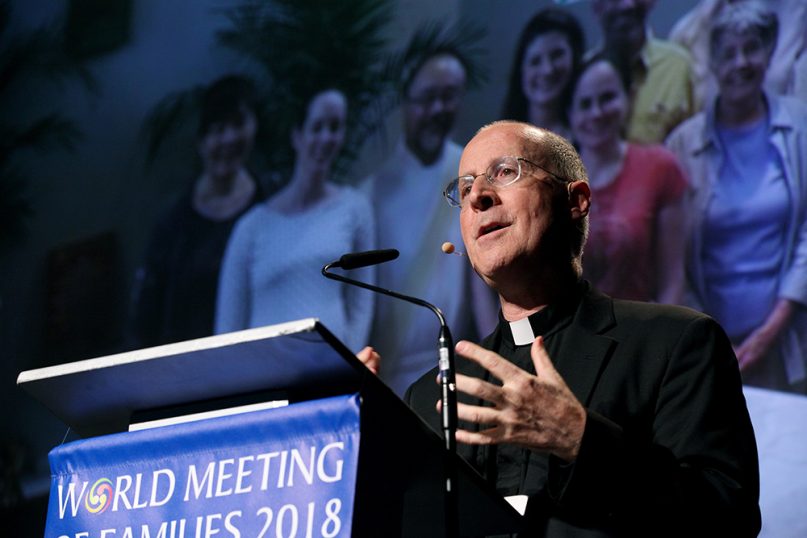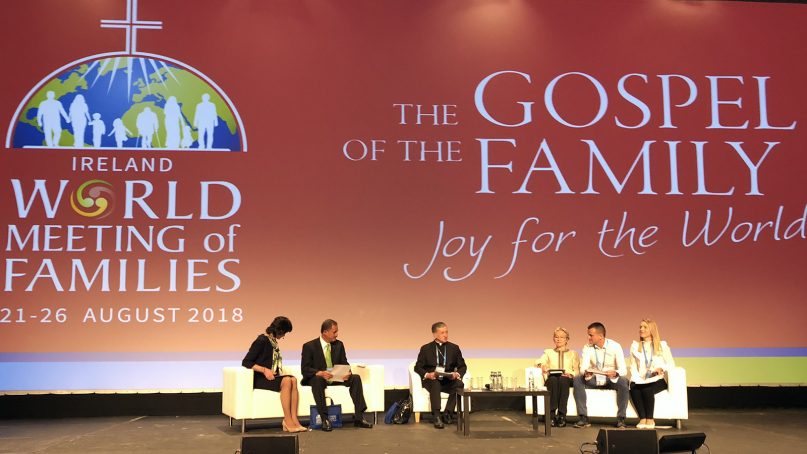DUBLIN (RNS) — A range of challenges to family life in the 21st century — from poor communication and alienation to sexual misconduct and the treatment of LGBT persons — dominated conversation at the Catholic Church’s World Meeting of Families this week.
Participants in the four-day pastoral congress heard talks by church leaders in the United States and beyond as they sought encouragement in the wake of ongoing abuse scandals and shifting societal attitudes about sexuality.

Cardinal Blase Cupich, Archbishop of Chicago, at a press briefing at the Pastoral Congress for the World Meeting of Families in Dublin on Aug. 23, 2018. Photo by John McElroy on behalf of WMOF 2018
Cardinal Blase Cupich, the archbishop of Chicago, addressed the clergy sexual abuse crisis on the heels of a Pennsylvania grand jury report that found child sex abuse by more than 300 priests over a 70-year period. He said that church leaders run the risk of forfeiting moral authority if they don’t consistently stand up for every person’s dignity.
“If each of us do not witness to the truth of our teaching on the human person as a relational being in our own lives, the fundamental dignity of each of us as children of God, then we cannot pretend to teach,” said Cupich.
A standing-room-only crowd packed in to hear American Jesuit priest James Martin outline steps that parishes can take to minister to LBGT Catholics. Martin said that parishioners are as much a part of the church as the pope, the local bishop or the parish priest.
“By not welcoming and by excluding LGBT Catholics, the church is falling short of its call,” said Martin, and is “tearing apart the body of Christ.”
Martin said that LGBT inclusion is a “life issue” in many countries. He encouraged Catholics to be prophetic voices for those who are persecuted for their sexual orientation. In places where LGBT people are marginalized, he said, laypeople can repent on behalf of the whole church.
“If they were harmed by the church, you are a minister of the church. You can apologize,” said Martin.

The Rev. James Martin gives a talk entitled, ‘Showing Welcome and Respect in our parishes for LGBT people and their families’ at the Pastoral Congress for the World Meeting of Families 2018 in Dublin on Aug. 23, 2018. Photo by Jonn McElroy on behalf of WMOF 2018
Many in attendance belong to traditional families, but not everyone. Former nun Becky Duddy-Burke of Boston and her wife, Marianne, were motivated to attend after what they said was a negative experience at the 2015 World Meeting of Families in Philadelphia.
“The level of toxicity and hate and damaging rhetoric that was coming from the podiums that was not meeting the needs of the people who were attending was stunning,” said Marianne Duddy-Burke. “We felt like there needed to be a presence here again so that our stories would be included, and that we could be visible as members of the church.”
At the Philadelphia meeting, they said, they were told they suffered from “same-sex attraction disorder,” Marianne Duddy-Burke said. In Dublin, people have been welcoming and the message is toned down even if it is essentially the same, she said.

Marianne Duddy-Burke at the WMOF 2018 in Ireland. RNS photo by Christine A. Scheller
“It’s still consistent that God’s plan for humanity is a mother, a father and their biological children and everything else falls short,” Duddy-Burke said.
Speakers at the event insisted that Catholic teachings hold keys to engaging others with respect and love. What’s needed in their view is not to remake or replace church doctrine but to embrace and live into it more fully.
Cupich, for instance, said he believes there is wisdom in the Catholic tradition that can enlighten and encourage believers in these “disturbing circumstances” of clergy sex abuse.
Quoting from Pope Francis’ apostolic exhortation “Amoris Laetitia (The Joy of Love),” Cupich said, “Sexuality is not a means of gratification or entertainment; it is an interpersonal language wherein the other is taken seriously, in his or her sacred and inviolable dignity.”
For families in attendance, the event also provided venues to share how Catholic ministries have made a difference in their lives. That was the case for Leigh and Steve Baumann of Jekyll Island, Ga. They said they began leading separate lives 17 years into their marriage after their two children had grown up and left home.
They credited the peer-led Catholic program Retrouvaille with saving their marriage. Retrouvaille begins with a weekend intensive and is followed by sessions on communication, intimacy and handling conflict and small-group support.
“When you’re in conflict in marriage, you don’t really see down the road,” said Leigh Baumann. “And so for us at that point, we had no way of knowing how important it would be for us to be grandparents together and to see what that next step in our journey was.”





